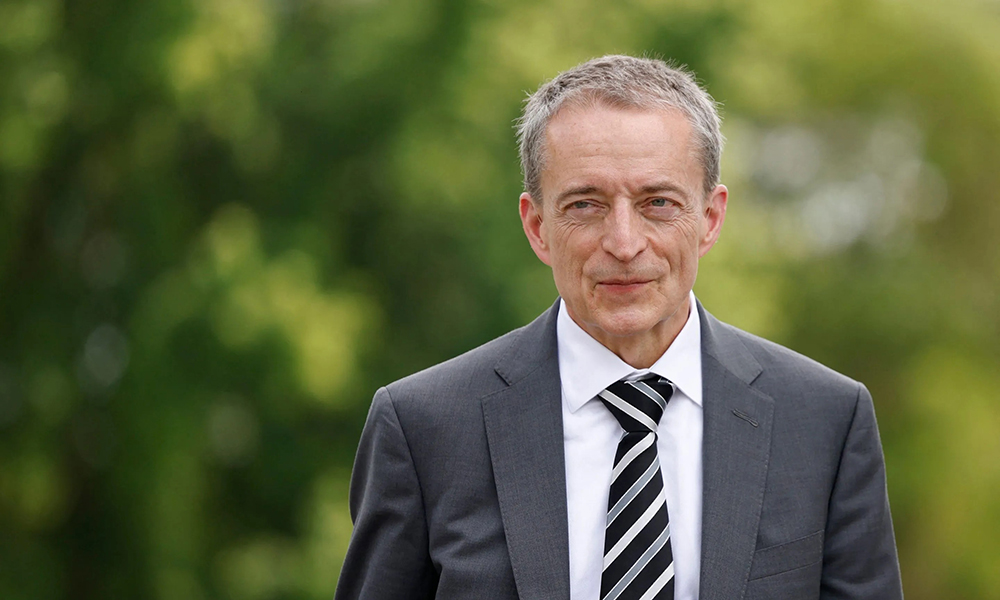
英特尔前首席执行官帕特·基辛格的困境或许给那些经历“回旋镖”式职业路径的高管们敲响了警钟:即便一家公司邀请你重返领导层,并任命你为首席执行官,蜜月期也可能转瞬即逝。
近日,英特尔董事会宣布基辛格卸任首席执行官一职。该公司并未宣布继任者人选,而是任命两位高管为临时联席首席执行官,以接替基辛格。基辛格一直在英特尔工作,担任首席执行官仅三年时间。英特尔还表示,基辛格将退出董事会。换言之,该公司几乎没给外界留下任何猜测其离职原因的空间。
基辛格在一份声明中说:“今天无疑是百感交集的一天,因为在职业生涯的大部分时间里,英特尔一直是我生活的重心。”
作为回应,英特尔的股价在盘前交易中飙升了5%,但随后再次下滑。圣塔克拉拉大学(Santa Clara University)莱维商学院管理学副教授乔-艾伦·波兹纳(Jo-Ellen Pozner)表示,股价飙升很可能是董事会期望实现的目标。她告诉《财富》杂志,公司往往会选择发布此类重大声明,原因是它们认为华尔街会做出积极回应。这是公司展现其对战略转型持严肃态度的一个信号,尤其是当高管不仅失去了其职位,还失去了董事会席位时。
波兹纳表示:“当首席执行官被替换,且此过程中并未发生重大丑闻或任何不当行为时,他们往往会保留董事会席位,即便这可能只是一个名义上的职位。这种做法是对他们在任期间所做贡献的认可,同时也是对其作为团队重要一员身份的肯定,尽管公司现在需要做出一些改变。”
她补充说,将基辛格从董事会中除名“似乎是雪上加霜”。
试图扭转局面
考虑到基辛格在公司的经历,他的突然离职出乎意料。早在上世纪80年代,他就在英特尔开始了自己的职业生涯,在那里工作了几十年,直至2009年离开,转而领导软件公司VMWare。
从担任英特尔首席执行官开始,基辛格就肩负着扭转公司颓势的重任。英特尔曾是行业的领导者,却在尖端芯片技术上落后于竞争者。此前,该公司对智能手机的兴起反应迟缓,错失了移动设备芯片需求激增的良机。最近,它又未能预见到人工智能的蓬勃发展,只能目睹竞争对手英伟达(Nvidia)抓住这一机遇,市值飙升至3万亿美元以上。
当基辛格接任首席执行官时,他制定了一项雄心勃勃的计划,这需要数年时间来逐步实施。在他的引领下,英特尔开始生产芯片并将其出售给其他公司。该计划需要数十亿美元资金,其中包括拜登政府的《芯片和科学法案》提供的约200亿美元补贴。正如《财富》杂志报道的那样,尽管有巨额投资,英特尔今年成果寥寥。相反,公司股价暴跌。8月份,该公司宣布将裁员15%,并寻求削减100亿美元开支。英特尔的业绩下滑如此严重,以至于有报道称高通(Qualcomm)将其视为潜在收购对象。
在此背景下,基辛格失去了董事会的信任。彭博社援引知情人士报道称,因基辛格在追赶英伟达方面进展缓慢,董事们对其感到不满。英特尔董事会独立主席弗兰克·耶里(Frank Yeary)如今将暂代执行主席一职。
遭解雇的一年
这对基辛格来说可能起不到安慰作用,但他并非孤例,今年还有多位首席执行官突然遭到解雇,其中包括CVS的凯伦·林奇(Karen Lynch)、派拉蒙全球(Paramount Global)的鲍勃·巴基什(Bob Bakish)和星巴克(Starbucks)的纳思瀚(Laxman Narasimhan)。
高管咨询公司光辉国际(Korn Ferry)今年秋天指出:“2024年似乎是众多董事会对首席执行官失去耐心的一年。”该公司发现,今年上半年首席执行官遭解雇人数创下历史新高。基辛格并不是唯一一位在没有指定继任者的情况下遭到解雇的领导者:Peloton、莱迪思半导体(Lattice Semiconductor)和普尔斯马特(PriceSmart)的情况也是如此。
波兹纳认为,在整个美国企业界,董事会可能因市场普遍的焦虑情绪而仓促行事,尤其是在总统大选和特朗普计划调整贸易政策的背景下:“当前存在诸多不确定性,难以预测什么能让人们感到快乐,也难以把握人们在生活领域真正追求的是什么。"
她补充说:“公司可能会采取大胆举措,因为它们担心被甩在后面。”董事会似乎在想:"我们要尝试一些方法。我们宁愿主动出击,也不愿坐以待毙。”(财富中文网)
译者:中慧言-王芳
英特尔前首席执行官帕特·基辛格的困境或许给那些经历“回旋镖”式职业路径的高管们敲响了警钟:即便一家公司邀请你重返领导层,并任命你为首席执行官,蜜月期也可能转瞬即逝。
近日,英特尔董事会宣布基辛格卸任首席执行官一职。该公司并未宣布继任者人选,而是任命两位高管为临时联席首席执行官,以接替基辛格。基辛格一直在英特尔工作,担任首席执行官仅三年时间。英特尔还表示,基辛格将退出董事会。换言之,该公司几乎没给外界留下任何猜测其离职原因的空间。
基辛格在一份声明中说:“今天无疑是百感交集的一天,因为在职业生涯的大部分时间里,英特尔一直是我生活的重心。”
作为回应,英特尔的股价在盘前交易中飙升了5%,但随后再次下滑。圣塔克拉拉大学(Santa Clara University)莱维商学院管理学副教授乔-艾伦·波兹纳(Jo-Ellen Pozner)表示,股价飙升很可能是董事会期望实现的目标。她告诉《财富》杂志,公司往往会选择发布此类重大声明,原因是它们认为华尔街会做出积极回应。这是公司展现其对战略转型持严肃态度的一个信号,尤其是当高管不仅失去了其职位,还失去了董事会席位时。
波兹纳表示:“当首席执行官被替换,且此过程中并未发生重大丑闻或任何不当行为时,他们往往会保留董事会席位,即便这可能只是一个名义上的职位。这种做法是对他们在任期间所做贡献的认可,同时也是对其作为团队重要一员身份的肯定,尽管公司现在需要做出一些改变。”
她补充说,将基辛格从董事会中除名“似乎是雪上加霜”。
试图扭转局面
考虑到基辛格在公司的经历,他的突然离职出乎意料。早在上世纪80年代,他就在英特尔开始了自己的职业生涯,在那里工作了几十年,直至2009年离开,转而领导软件公司VMWare。
从担任英特尔首席执行官开始,基辛格就肩负着扭转公司颓势的重任。英特尔曾是行业的领导者,却在尖端芯片技术上落后于竞争者。此前,该公司对智能手机的兴起反应迟缓,错失了移动设备芯片需求激增的良机。最近,它又未能预见到人工智能的蓬勃发展,只能目睹竞争对手英伟达(Nvidia)抓住这一机遇,市值飙升至3万亿美元以上。
当基辛格接任首席执行官时,他制定了一项雄心勃勃的计划,这需要数年时间来逐步实施。在他的引领下,英特尔开始生产芯片并将其出售给其他公司。该计划需要数十亿美元资金,其中包括拜登政府的《芯片和科学法案》提供的约200亿美元补贴。正如《财富》杂志报道的那样,尽管有巨额投资,英特尔今年成果寥寥。相反,公司股价暴跌。8月份,该公司宣布将裁员15%,并寻求削减100亿美元开支。英特尔的业绩下滑如此严重,以至于有报道称高通(Qualcomm)将其视为潜在收购对象。
在此背景下,基辛格失去了董事会的信任。彭博社援引知情人士报道称,因基辛格在追赶英伟达方面进展缓慢,董事们对其感到不满。英特尔董事会独立主席弗兰克·耶里(Frank Yeary)如今将暂代执行主席一职。
遭解雇的一年
这对基辛格来说可能起不到安慰作用,但他并非孤例,今年还有多位首席执行官突然遭到解雇,其中包括CVS的凯伦·林奇(Karen Lynch)、派拉蒙全球(Paramount Global)的鲍勃·巴基什(Bob Bakish)和星巴克(Starbucks)的纳思瀚(Laxman Narasimhan)。
高管咨询公司光辉国际(Korn Ferry)今年秋天指出:“2024年似乎是众多董事会对首席执行官失去耐心的一年。”该公司发现,今年上半年首席执行官遭解雇人数创下历史新高。基辛格并不是唯一一位在没有指定继任者的情况下遭到解雇的领导者:Peloton、莱迪思半导体(Lattice Semiconductor)和普尔斯马特(PriceSmart)的情况也是如此。
波兹纳认为,在整个美国企业界,董事会可能因市场普遍的焦虑情绪而仓促行事,尤其是在总统大选和特朗普计划调整贸易政策的背景下:“当前存在诸多不确定性,难以预测什么能让人们感到快乐,也难以把握人们在生活领域真正追求的是什么。"
她补充说:“公司可能会采取大胆举措,因为它们担心被甩在后面。”董事会似乎在想:"我们要尝试一些方法。我们宁愿主动出击,也不愿坐以待毙。”(财富中文网)
译者:中慧言-王芳
Pat Gelsinger’s plight at Intel might be a warning for boomerang executives: Even when a company wins you back and appoints you CEO, the honeymoon can end in a flash.
Intel’s board of directors announced Gelsinger’s retirement as chief executive, effective yesterday, today. The company didn’t name a successor and instead appointed two executives as interim co-CEOs to replace Gelsinger, a former Intel lifer who has been CEO for only three years. Intel also said Gelsinger was stepping down from the board. In other words, the company left little room for interpretation that Gelsinger was ousted.
“Today is, of course, bittersweet as this company has been my life for the bulk of my working career,” Gelsinger said in a statement.
In response, Intel share prices shot up by 5% in premarket trading before slipping again. But that bump may have been the board’s goal, says Jo-Ellen Pozner, associate professor of management at the Leavey School of Business at Santa Clara University. Companies often choose to make big statements like this because they know Wall Street will respond favorably, she tells Fortune. It’s a signal that the company is serious about a strategic change in direction, particularly when an executive loses their board seat as well.
“When a CEO is replaced, when there hasn’t been a significant scandal or some whiff of wrongdoing, they’ll retain their seat on the board, even if it’s a kind of ceremonial position,” Pozner says. “It’s an acknowledgment that they’ve contributed, that they are an important part of the team, but that a change is needed.”
Removing Gelsinger from the board, she added, “seems like adding insult to injury.”
Attempted turnaround
Gelsinger’s abrupt departure was unexpected given his history at the company. He started his career at Intel in the 1980s and spent decades there before leaving to lead software company VMWare in 2009.
From the beginning of his CEO tenure at Intel, Gelsinger was meant to be a turnaround man. Once a category leader, Intel had fallen behind its competitors in terms of cutting-edge chips. It had previously been late to respond to the rise of smartphones and missed out on a surge of demand for chips made for mobile devices. More recently, it failed to predict the AI boom and watched competitor Nvidia seize on the opportunity, then balloon to a market cap of over $3 trillion.
When Gelsinger took over as CEO, he laid out an ambitious plan that would take several years to execute. Under his guidance, Intel would begin manufacturing chips and selling them to other companies. The plan required billions, including some $20 billion in subsidies from the Biden administration’s CHIPS and Science Act. But, as Fortune reported, Intel had little to show for that level of spending this year. Instead, its share price nose-dived. In August, the company announced it would lay off 15% of its staff and look for $10 billion in spending cuts. The downfall was so severe that Qualcomm reportedly saw Intel as a potential takeover target.
Against this backdrop, Gelsinger lost the board’s confidence. Citing sources close to the situation, Bloomberg reported that directors were frustrated with Gelsinger’s slow progress in chasing Nvidia’s lead. Frank Yeary, an independent chair of the board of Intel, will now serve as interim executive chair.
A year of ousters
It might be cold comfort to Gelsinger, but he joins a long list of CEOs who have abruptly departed their roles this year, including Karen Lynch at CVS, Bob Bakish at Paramount Global, and Laxman Narasimhan at Starbucks.
“It appears that 2024 is a year in which many boards have lost patience with CEOs,” executive consulting firm Korn Ferry noted this fall, pointing to a record rise it detected in CEO firings for the first half of the year. Gelsinger isn’t the only leader to be shown the door without any named successors: The same was true at Peloton, Lattice Semiconductor, and PriceSmart.
Across corporate America, boards may be acting hastily in response to profound anxiety about the markets, Pozner suggests, especially in the wake of the presidential election and Trump’s plans to shake up trade policies: “There’s just a lot of uncertainty about what is going to make people happy, and what people are really looking for in all domains of life.”
“Companies might be taking big swings because they’re worried about getting left behind,” she adds. Boards seem to be thinking, “We’ll try something. We’d rather go down swinging than waiting to get caught off guard.”






